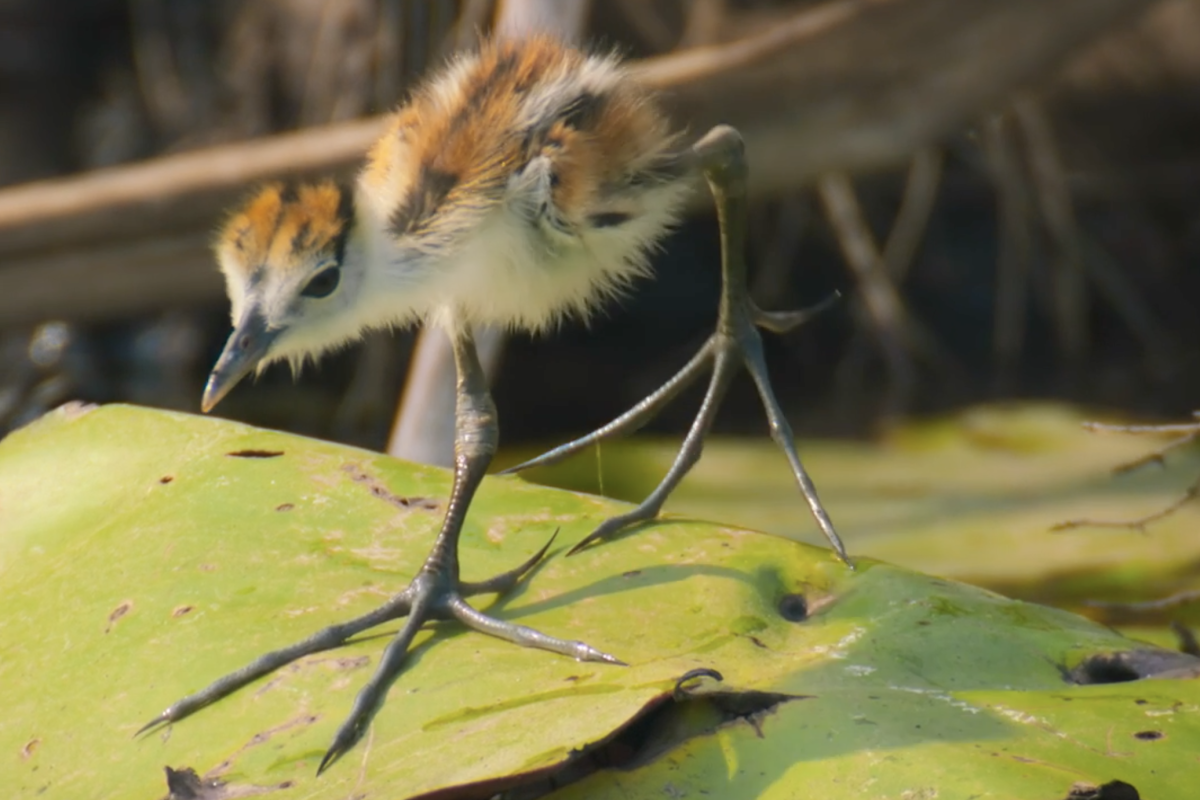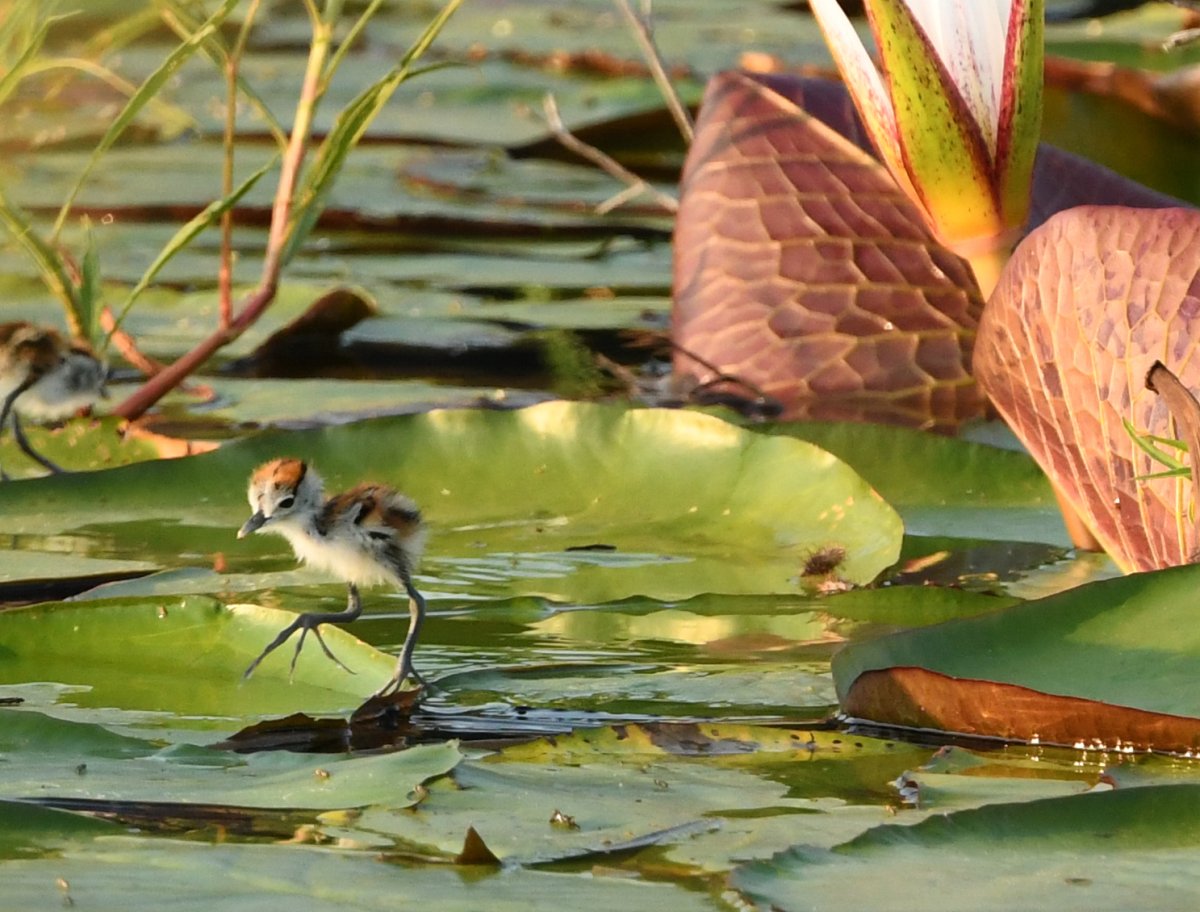Fascinating footage shows an "incredible" bird species whose chicks are born with gigantic feet and a remarkable ability to avoid predators.
The video clip, taken from the National Geographic documentary series Super/Natural, follows a group of newly born juvenile African jacana birds.

Found across a large portion of sub-Saharan Africa, these distinctive wading birds feature long toes and claws. These help them to walk effectively on floating vegetation, such as water lilies, in the shallow lakes where they are often found.
Their young hatch as matchbox-sized versions of the adults with disproportionately sized giant feet. The chicks are remarkably capable from the moment they are born.
"Jacana chicks really are incredible—they hatch out of the egg able to walk, swim and communicate with dad and each other, something that takes a few years for the average human child," Steph Thompson, a producer/director who worked on the "Bloodlines" episode from the series, told Newsweek.
"They can operate completely independently from their parent straight away, but their survival instinct is so strong that, as soon as dad raises the alarm, they shut down all autonomy and obey him."
This behavior can be seen in the video: the father of the jacana chicks spots a threat—a bird of prey—and sends out a secret alarm call. Upon hearing the sound, the chicks immediately freeze on command, appearing to play dead. Then, once the danger has passed, the father runs to pick them up.
The African jacana has evolved a highly unusual mating system in which one female mates with multiple males. The father alone cares for the chicks, incubating and rearing the juveniles. The male has even developed the ability to pick up and carry the chicks beneath his wings.
The huge feet of the jacanas, found on both the chicks and the adults, spreads the weight of the birds over a large surface area. This is a useful adaptation for the environments in which they live.
"Having those giant feet allows them to occupy a very specific ecological niche," Thompson said. "They can walk right into the centre of the lily field, away from terrestrial predators. If there is a threat from above, they can use their beaks as snorkels to remain submerged until danger's passed."
The Super/Natural series is executive-produced by renowned director James Cameron and narrated by actor Benedict Cumberbatch. It uses the latest technology to reveal the secret powers of some of the world's most extraordinary animals.
"Super/Natural enters a world just beyond human perception—where animals and plants use hidden powers and incredible senses to succeed," series producer Bill Markham told Newsweek.
"By combining the latest scientific revelation with cutting-edge filming technology, state-of-the-art VFX and immersive story-telling, we are able to present this parallel universe in an informed, engaging and beautiful way.
"We set ourselves the challenge of filming familiar animals doing unfamiliar things, and unfamiliar animals doing things you've never heard of," Markham said. "We explored how they see in different wavelengths, listen to sounds outside our hearing range, use electromagnetic forces and communicate in ways we never realized before."
The series documents a huge array of fascinating animal superpowers. These range from the incredible sense of smell of polar bears tracking their seal prey from miles away to ibexes climbing an incredibly steep sheer face of an Alpine dam.

Series producers said the filming of the documentary abounded with surprises. One that they highlight is the story of the extraordinary cuckoo catfish.
"These tiny fish are drawn to the mating pheromones of another fish, the Burtoni cichlid," Markham said.
"When the cichlids start laying their eggs, the catfish sneak in and lay their own eggs amongst the cichlid's clutch. Then they watch as the mother cichlid hoovers up all the eggs—incredibly, she will then brood them in her mouth until they hatch.
"But what she doesn't know is that she's ingested the catfish eggs as well—nor that they will hatch first, and eat the baby cichlids with which they share their unlikely nursery," Markham added. "Not surprisingly, the catfish babies grow fast, and soon their foster mother has to spit them out. No wonder they're called cuckoo catfish."
Markham also pointed to a tiny shrimp featured that wards off predators by snapping their pincers so fast that they release a high-velocity pressure bullet. This produces intense light and heat exceeding 8,540 degrees Fahrenheit and a sound louder than a gunshot—all via the formation and collapse of underwater cavitation bubbles.
One segment features a caterpillar that is taken underground by hungry ants. However, it has the ability to disguise its scent, so that it smells like ant larvae.
The caterpillar "sings a version of the queen ant's 'feed me' song so that the ants tend to their every need for two years until they're ready to emerge as adult butterflies," Markham said.
"But my favorite is the finger-length lizard in Costa Rica that can use its very own scuba [gear] to stay underwater for 18 minutes and escape its predators."
The series managed to achieve some filming firsts. One was capturing a mass gathering, mass hatching and the secret communication of Amazon river turtles.
"We also filmed an extraordinary story in East Africa for the first time—a species of tiny jumping spider that needs human blood to attract and win over potential mates," Markham said.
"The males' jaws are too small to get the blood directly from people, so they catch and milk well-fed mosquitoes to gather enough 'cologne.'"
Super/Natural airs on National Geographic every Tuesday at 8 p.m. and can be streamed on Disney+.
Uncommon Knowledge
Newsweek is committed to challenging conventional wisdom and finding connections in the search for common ground.
Newsweek is committed to challenging conventional wisdom and finding connections in the search for common ground.
About the writer
Aristos is a Newsweek science reporter with the London, U.K., bureau. He reports on science and health topics, including; animal, ... Read more
To read how Newsweek uses AI as a newsroom tool, Click here.








